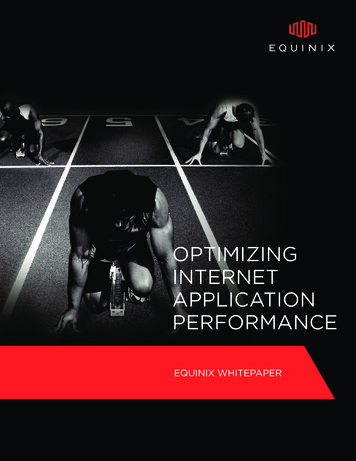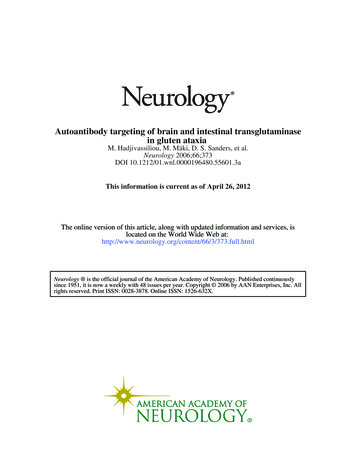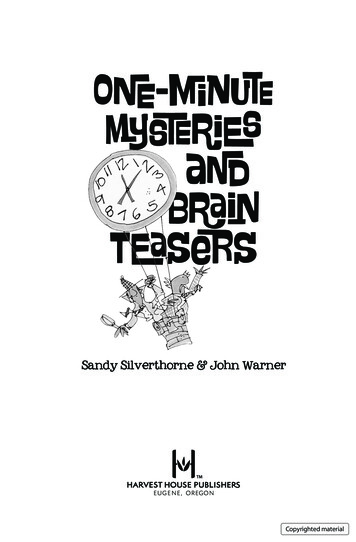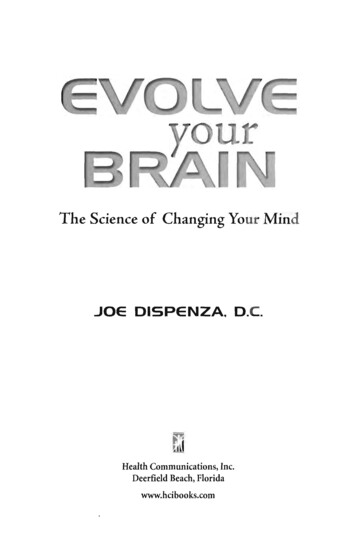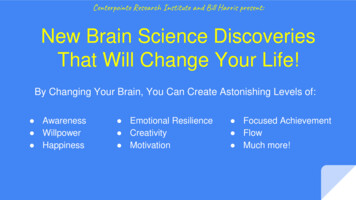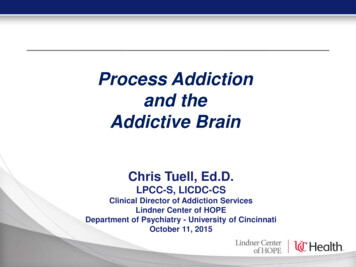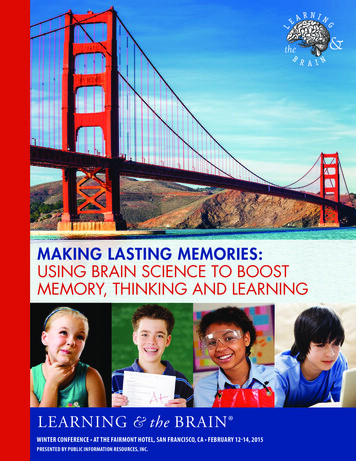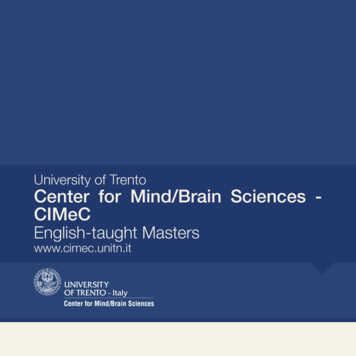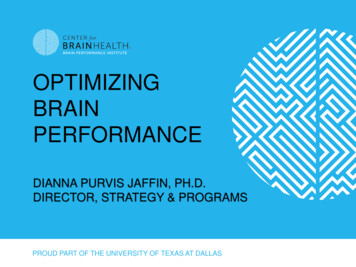
Transcription
OPTIMIZINGBRAINPERFORMANCEDIANNA PURVIS JAFFIN, PH.D.DIRECTOR, STRATEGY & PROGRAMSPROUD PART OF THE UNIVERSITY OF TEXAS AT DALLAS
OVERVIEW1.Introduction2.Exercise3.Stress4.Other Lifestyle Factors1.2.3.NutritionSleepSocial Relationships5.Cognitive Training6.Recommendations
HOLISTIC DOMAINS OF BRAIN onSleep
MODERN SOLDIERINGIncreased demand for decision makingVUCA environmentsIndividual is technologically enabledwith lethal weaponsDecision making pushed down to lowerlevelsNeed for accelerated learningResearch ongoing to identify preventivefactors for brain & mental health injury
LIFESPAN DOUBLES BRAINSPANHertzog et al., Psych. Science, 2009.
BOTTOM LINE UP FRONTOPTIMIZING BRAIN HEALTH ISNOT ACHIEVED BY AREDUCTIONIST APPROACH
A HOLISTIC APPROACH OPTIMIZES BRAIN & OVERALL HEALTHWHAT’S GOOD FOR THE HUMAN IS GOOD FOR THE BRAINThese elements work together synergistically to promotewhole body health and brain health Exercise Stress management Nutrition Sleep Social relationships Mental Activity
PHYSICAL ACTIVITY
EXERCISE STIMULATES NEUROGENESISNeurogenesis occurs in the brain – exercise trainingincreasesHippocampal size & memoryTotal brain volumeWhite matter volume & integrityExercise stimulates brain growth factors (neurotrophins)BDNF, IGF1, VEGF, & othersThese stimulate neurogenesis, angiogenesis, &neuroplasticity(Tarumi & Zhang, 2015)(Portugal, et al., 2013)(Dishman, et al. 2006)(Erickson, et al., 2011)(Voss, et al., 2015)(Erickson, et al., 2010)
PHYSICAL ACTIVITY HAS A POSITIVE EFFECT ONNEUROTRANSMITTERS(Portugal, et al., 2013)(Kayes & Hatfield, 2013)
Cognitive ReserveSTAYING FIT IMPROVES COGNITION & MENTAL HEALTH Improved affect & moodReduced negative affect & moodReductions in tension, anger, & depressionImproved reaction time, processing speed, perception,memory, attention, dual-task & task switching activities, &inhibitory processesReduced risk of age-related cognitive decline, dementia, &Alzheimer’s DiseaseIntellectual stimulation may play a modifying role on cognitivefunction & be synergistic with effects of exercise(Hogan, 2013)(Davenport et al., 2012)
EXERCISE ACROSS THE LIFESPANHigh fitness correlated with improvedbrain fitness (VO2max)Investment HypothesisLifelong physical activity combinedwith healthy lifestyle factors maybuffer against cognitive decline inagingAerobic activity in children iscorrelated with improved cognitivefunctionEmerging evidence indicates that aerobicand resistance training are important formaintaining cognitive & brain health inolder age(Voss, et al., 2015)(Kayes & Hatfield, 2013)(Scarmeas & Stern, 2003)(Rovio, et al, 2005)
IF ONLY THERE WERE A PILL Many experts often comment that if exercise came in apill then it would be the most sought after drug Improves brain structure & function Improves markers for cellular aging – telomere length Increases resting cerebral blood which tendsto decline with ageImproves a range of physical indices (Hogan, 2013)Blood pressureLipid profileBalanceStrengthEndurance Cardiovascular &cerebrovascularhealthAnd more!
Cognitive ReserveTHEORY OF COGNITIVE RESERVEAbility of an individual to tolerate progressive brain pathologywithout demonstrating clinical cognitive symptoms.1989 post mortem analysis of 137 individuals withAlzheimer’s Disease (AD)Symptoms vs. pathologyHigher brain weight and greater number ofneuronsHypothesis: Greater “reserve” of neurons and cognitiveabilities that offset losses of ADThus, the theory of cognitive reserve “ability of an individual totolerate progressive brain pathology without demonstratingclinical cognitive symptoms”(Stern, 2002)(Davenport, et al., 2012)
HOW MUCH EXERCISE?Daily Aerobic Activity75 min/wk (vigorous)/150 min/wk (moderate)3 hr per week vigorous physical activityMen had 22% lower risk myocardial infarction(Chomistek, et al., MSSE 43(10) 2011)Consider 300 (weight loss) min/week(Friedenreich, et al., 2015)Resistance Exercises 2-3 times per weekBody weightResistance – many alternative forms existStretch Daily 2 days/week major muscle groupsConsider yoga for flexibility and stress managementConsider stretching daily – before bedtime is good cueNeuromotor ExerciseFunctional fitness training 2-3 days/week for 20-30 min
STRESS
STRESS MANAGEMENT IS CRITICAL FOR BRAIN HEALTHWe are among the few animalsthat create stress by our thoughts Reduction of serotonin & dopaminein brain Chronic exposure to cortisol results ina smaller hippocampus (up to 14%) &hyperactive amygdala Increased sympathetic tone(Parasympathetic calms) Impaired memory & thinking ability Slows plasticity processes &accelerates brain aging(Lupien, et al., 2005)(Sapolsky, 2004)
EXERCISE BUFFERS STRESS RESPONSEPhysically trained individuals show lower physiological &psychological responses to stressorsIn one study, participants with a higher aerobic fitness (VO2max) hadlower cortisol response to a stressful taskChronic exercise induces important moderating changes inresponse to stressEXERCISE IS A POWERFUL STRATEGY TO MITIGATESTRESS(Zschucke, et al., 2014)(Portugal, et al., 2013)
MINDFULNESS TRAINING (MT): AN ANTIDOTE TO STRESSMindfulness:Paying attention, in a particular way; on purpose, in the present moment,& non judgmentally - Jon Kabat-ZinnOne month MT improved attention & self-regulation with less negativemoods White matter changes & blood flow in anterior cingulate gyrus More positive & less negative mood self-reports Less depression & anxiety stress-induced cortisol Improved attention & self-regulation 20-30 min/day 5 days/week(Tang, et al., 2015)Gray matter structural changes Showed increases in gray matter in hippocampus, posterior cingulatecortex, temporo-parietal junction, & cerebellum (8 weeks 45 min/day (body scan, sitting meditation, & mindful yoga)(Holzel, et al., 2011)
HOW IS MINDFULNESS PRACTICED?From mindfulnet.org
BENEFITS OF MINDFULNESS TRAININGMindfulness training promotes Well-being (Goyal et al., 2014) Strengthens attention &working memoryStress increases mind-wanderingoff-task thoughts, and performancefailures Stress decreases attentionalfocus & negative mood(Jha, et al., 2010; Maclean, et al., 2010; Van Vugt & Jha, 2011;Baijal, et al., 2011; Leonard, et al., 2013)A wandering mind is anunhappy mind(Killingsworth & Gilbert, 2010)
MINDFULNESS & TRAUMATIC BRAIN INJURY (TBI)Study: Investigated brief mindfulness trainingon an over-selectivity task in a sample of TBIpatients10 min mindfulness awareness of breathingexerciseResults: Brief mindfulness exercise canreduce levels of stimulus over-selectivity2013
SYNERGIST EFFECTS OF COMBINEDPHYSICAL ACTIVITY & MINDFULNESS TRAINING30 min focused attentionMEDITATION 30 min moderateintensity AEROBIC EXERCISE COGNITIVE CONTROL DEPRESSION & RUMINATIONCombination of mental & physicaltraining results in greater cognitivegains than either one aloneCombined cognitive & exercise trainingcan be effective for improving cognitivefunctions & functional status of olderadults with & without cognitiveimpairment
In theory there is no differencebetween theory and practice.In practice there is.- Yogi Berra
NUTRITION
NUTRITION FOR BRAIN HEALTH Mediterranean diet may be effective to slow cognitive declineassociated with aging Emphasis on plant foods, less animal foods & dairy, andconsumption of olive oil, fish, berries, vegetables High consumption of vegetables, particularly leafy greensmay be correlated with slower cognitive decline with aging According to Henriette vanPraag from National Institute onAging, effects of exercise on brain may be enhanced byconsumption of foods containing omega fatty acids and plantphytochemicals(Morris, et al., 2015)(Morris, el al., 2006)(Kang, et al., 2005)(Nooyens, et al., 2011)(Chen, et al., 2012)
OTHER LIFESTYLEFACTORS
OTHER LIFESTYLE FACTORSSleep Critical for brain and overall health Most need 7-8 hours per night Sleep deprivation/disturbances increase risk for chronicdisease, depression, & impaired cognitive performance Clears toxins(Irwin, 2014; Balkin, 2014; Xie, et al., 2013)Social Relationships Loneliness is a risk factor for poor cognitive function inolder adults Many studies have shown that loneliness increases risk ofdementia and depression Strong relationships bolster psychological resilience(Zhong et al., 2016; Cacioppo, et al., 2014; Seeman, et al., 2001)
COGNITIVE TRAINING
FALSE CLAIMS AND DECEPTIVE ADVERTISING
MRMC ENVIRONMENTAL SCAN & LITERATURE REVIEW Data presented at OTSG’s Brain HealthConsortium April 2014 Only 10% (n 17/154) of the identifiedbrain fitness products had efficacy data Of those with efficacy data, 9 productsshowed some improvement in eitherworking memory or attention in a healthyadult population There is a strong correlation betweentargeted training and working memoryimprovements Video games may improve processingspeed & attention
MRMC CONCLUSIONS Some evidence exists that supports theuse of brain training products to improvebrain health, but studies are small andresults vary across studies Much more study needed to determinedose response and future studies shouldseek to standardize methods
RECENT SYSTEMATIC REVIEW ARTICLE Comprehensive review of computerizedrehabilitation treatments for attention &executive function for acquired brain injury Evidence suggests significantimprovements in attention & executivefunction in 23/28 studies Results are promising Limitations–Small sample sizes 26/28 fewer than 50 subjects,some as few as 1-4–Lack of control groups in 1/3 studies–Mixed methods & lack of standardized outcomemeasures–Large variety of outcome measures used
THE BRAIN FITNESS CENTERNICOE BLDG 19; 5TH FLOOR, AUDIOLOGY AND SPEECH CENTERA resource to help patientsgain a head-to-toe workout;available for anyone lookingto optimize performanceregardless of diagnosis.THREE CURRENTRESEARCH PROTOCOLSCOMMERCIAL COMPUTERBASED PROGRAMSORRB AND HRV EMWAVEBIOFEEDBACK TRAININGWEEKLY MIND-BODY& HRV CLASSESBFC StaffDirectorKate Sullivan, M.S. CCC-SLPPrincipal InvestigatorLouis French, PsyDNeuropsychology SupportWendy Law, PhDResearch AssistantsStephanie MarbleSarah Kensky, MPHErin HagenQuestions and referrals: (301) 319-2178 or stephanie.a.marble2.ctr@mail.mil
STRATEGICMEMORYADVANCEDREASONINGTRAINING
SMART: A BRAIN CHANGERDeveloped by Center for BrainHealth research teamStrategy-based “top-down” cognitive brain training programSMART provides a way of thinkingUses practical strategies that require concerted effort in order tostrengthen frontal networks, increase mental efficiency andproductivity, and build cognitive resilienceHow to think, not what to think.
SMART TRAINING PROTOCOLTop-down processing strategies to apply to daily tasks:1. Strategic Attention – Input Management– Management of input by blocking distractions & irrelevant input– Practice regular mental breaks– Limit multi-tasking – focus on single task2. Integrated Reasoning – Dynamic Updating of Input– Engage in synthesis, abstraction, meaning, & implementation processes –“gist reasoning”3. Innovative Thinking – Cognitive Flexibility– Examine information from divergent perspectives– Develop multiple solutions to problems– Formulate novel applicationsStrengthens problem solving skills & mitigates concrete thinkingwhile developing deeper level thinking(Vas, Spence, & Chapman, 2015), (Vas, et al., 2015), (Chapman, 2013)
BRAIN PERFORMANCESTRATEGIESExercise & stay activeManage stressEat well - consider a Mediterranean dietSleep 7-8 hours per nightUse your brain wellBuild strong bondsLive with joy
30.03.2016 · (Stern, 2002) (Davenport, et al., 2012) THEORY OF COGNITIVE RESERVE . Daily Aerobic Activity . 75 min/wk (vigorous)/150 min/wk (moderate) 3 hr per week vigorous physical activity . Men had 22% lower risk myocardial infarction (Chomistek, et al., MSSE 43(10) 2011) Consider 300 (weight loss) min/week (Friedenreich, et al., 2015) Resistance Exercises 2-3 times per week . Body weight .
